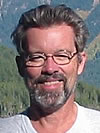 Mott Greene |
2016 Mary C. Rabbitt History And Philosophy of Geology Award
Presented to Mott Greene
Citation by Henry Frankel
Mott T. Greene, highly deserving recipient of the 2016 Rabbit Award, has been a leading historian of the Earth Sciences for almost 40 years. An undergraduate sociology major at Columbia University from 1963 to 1967, he remained at Columbia for more two years studying Japanese before switching to history of science at the University of Washington, obtaining his Ph.D. in 1978. After teaching at Skidmore College, in 1985 he became the John B. Magee Professor of Science and Values at the University of Puget Sound, retiring in 2012. Mott has authored three books, many papers, including five in Nature and one in Nature Geoscience. What clearly shows from his work is the originality of his mind.
Mott’s first book, Geology in the Nineteenth Century appeared in 1982. Rachel Laudan reviewed it in Science, correctly concluding that it “deserves serious attention.” It still does. A year later, he received a MacArthur Fellowship. The MacArthur foundation recognized two outstanding characteristics of his work: he gets to the central elements of an issue, and he isn’t afraid to say what he finds, even if it is unpopular. Mott did just that in his 1992 Natural Knowledge in Preclassical Antiquity. Knowing that classicists would criticize his iconoclastic approach, he did not waver. His essays on Thales and Hesiod’s Theogony are brilliant and entertaining.
Mott has devoted much of his research to Wegener. Thanks to Mott’s 2015 Alfred Wegener we now have the definitive scientific biography of Wegener. We learn of Wegener, the son, the father, the brother, the husband, the atmospheric scientist, the polar explorer, and the first to argue extensively for continental drift. Pearce Williams, who wrote the definitive biography of Michael Faraday, told Mott that in writing a scientific biography one should read everything that one’s subject read. Mott did just that in working on Wegener. But he did more. He also spent a week camping out on Greenland’s icecap to get a feel for how difficult it was to live and work under such conditions.
I have been lucky to know Mott for almost 50 years. More than anyone else, he taught me, a philosopher of science, how to do history of science.
 2016 Mary C. Rabbitt History And Philosophy of Geology Award — Response by Mott Greene
2016 Mary C. Rabbitt History And Philosophy of Geology Award — Response by Mott Greene
Dear colleagues and friends. I first want to thank Hank Frankel for his kind words about my work. I also want to thank my colleagues in the History and Philosophy of Geology Division of the GSA for bestowing on me the honor of the Mary C. Rabbitt Award. I have known and worked with many of you for decades now, and published a lot of your work during my stint as editor of Earth Sciences History in the 1990s.
There are very few professional historians or philosophers specializing in the earth sciences, a few dozen at most, compared to the many hundreds working in the history of biology and the history of physics. This has meant, among other things, that most of the weight of researching and writing the history of the earth sciences has fallen and continues to fall upon working scientists. In some other disciplines this might not work out so well, but geology is a historical science, so the work of scientist-historians in the earth sciences tends to be much superior to work done by scientists writing history of chemistry, physics, and to a certain extent biology.
This dependence upon historical work by scientists has another very positive aspect, and that is that writing in the history of geology tends to be very rich in scientific content. At a time when many other parts of the history of science have turned to writing what I call “consumer history”—the experiences of and reactions to science of people who are not scientists, but who feel the effects of science—the history of the earth sciences, and the history of geology in particular, continue to focus on the analysis of the actual doing of science by scientists—what might be called “producer history.” While both consumer history and producer history are legitimate approaches to the subject matter, it is the latter that holds most interest for me.
Having completed my biography of Alfred Wegener, I am now working on a short book called Science Now, about the changes in the practice of science since about 1980: a turn in almost all sciences to multi-author papers, ever-greater dependence on instrumentation, a preference for model building over theory construction, and a huge emphasis on computation. Moreover, with many more scientists at work, there is much fiercer competition for attention, and greater demands for immediate payoff. This, of course, produces many challenges for working scientists, but this transformation of the way that science is being done now also provides—for those with an interest in the history and philosophy of science—a mother lode of incredibly rich material to mine, assay, and understand. As I move into retirement, I look forward to seeing this great transformation chronicled and analyzed by you and your colleagues and students. Thank you all!
